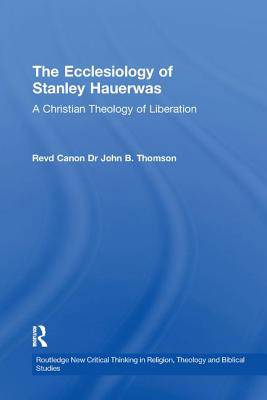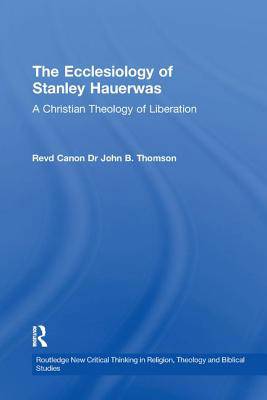
Je cadeautjes zeker op tijd in huis hebben voor de feestdagen? Kom langs in onze winkels en vind het perfecte geschenk!
- Afhalen na 1 uur in een winkel met voorraad
- Gratis thuislevering in België vanaf € 30
- Ruim aanbod met 7 miljoen producten
Je cadeautjes zeker op tijd in huis hebben voor de feestdagen? Kom langs in onze winkels en vind het perfecte geschenk!
- Afhalen na 1 uur in een winkel met voorraad
- Gratis thuislevering in België vanaf € 30
- Ruim aanbod met 7 miljoen producten
Zoeken
€ 106,95
+ 213 punten
Uitvoering
Omschrijving
This book presents the theological work of Stanley Hauerwas as a distinctive kind of 'liberation theology'. John Thomson offers an original construal of this diffuse, controversial, yet highly significant modern theologian and ethicist. Organising Hauerwas' corpus in terms of the focal concept of liberation, Thomson shows that it possesses a greater degree of coherence than its usual expression in ad hoc essays or sermons. John Thomson locates Hauerwas in relation to a wide range of figures, including the obvious choices - Rauschenbusch, Niebuhr, Barth, Yoder, Lindbeck, MacIntyre, Milbank and O'Donovan - as well as less expected figures such as Gadamer, Habermas, Ricoeur, Pannenberg, Moltmann, and Hardy. Providing a structured and rigorous outline of Hauerwas' intellectual roots, this book presents an account of his theological project that demonstrates an underlying consistency in his attempt to create a political understanding of Christian freedom, reaching beyond the limitations of the liberal post-enlightenment tradition. Hauerwas is passionate about the importance of moral discourse within the Christian community and its implications for the Church's politics. When the Church is often perceived to be in decline and an irrelevance, Hauerwas proffers a way of recovering identity, confidence and mission, particularly for ordinary Christians and ordinary churches. Thomson evaluates the comparative strengths and weaknesses of Hauerwas' argument and indicates a number of vulnerabilities in his project.
Specificaties
Betrokkenen
- Auteur(s):
- Uitgeverij:
Inhoud
- Aantal bladzijden:
- 256
- Taal:
- Engels
- Reeks:
Eigenschappen
- Productcode (EAN):
- 9781138264250
- Verschijningsdatum:
- 27/02/2017
- Uitvoering:
- Paperback
- Formaat:
- Trade paperback (VS)
- Afmetingen:
- 156 mm x 234 mm
- Gewicht:
- 362 g

Alleen bij Standaard Boekhandel
+ 213 punten op je klantenkaart van Standaard Boekhandel
Beoordelingen
We publiceren alleen reviews die voldoen aan de voorwaarden voor reviews. Bekijk onze voorwaarden voor reviews.









